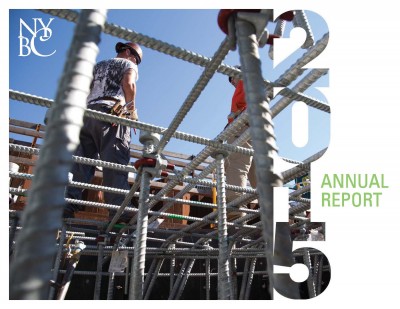
Annual Report 2015
Advocacy
2015 Policy Agenda
Despite a growing recognition at all levels of government that maintaining and expanding public facilities to address population growth, climate change, and economic competition is an imperative, New York is barely treading water. The Building Congress 2015 Policy Agenda advocates important steps New York City and State officials must take to move the New York metropolitan area forward and ensure it stays competitive in the future. The 2015 Policy Agenda is guided, in large part, by the Building Congress Infrastructure Campaign, which is designed to focus public attention on the need for intelligent investment in core assets, such as mass transit, roads, and schools, and by ongoing Building Congress efforts to move government to improve its procurement practices.
 State Agenda
State Agenda
At the State level, enacting a fully funded transportation program is the top priority. The MTA's proposed 20152019 capital program has a $32 billion price tag, but faces a $14 billion funding shortfall, and the New York State Department of Transportation likewise faces a significant capital funding hole. To close these gaps, the State Agenda calls on the Governor and Legislature to adopt new, dedicated revenue sources to fund both programs. Because the adoption of new revenue sources may not be enough to meet its vast infrastructure needs, the State must expand its capacity to deliver major capital projects in other ways, including through the use of alternative methods to traditional design-bid-build procurement. The Building Congress, therefore, urges the State to pass legislation permitting public-private partnerships and authorizing broader use of design-build, both of which encourage innovative financing and increased efficiencies in the management of major infrastructure projects.
Passage of the Emergency Responder Act is another principal Policy Agenda item. The Building Congress is partnering with other statewide design and construction associations to secure strong new protections from debilitating liability claims for contractors responding to government-declared emergencies, such as 9/11 and Superstorm Sandy.
City Agenda
Ensuring a robust capital budget remains the chief local priority. It appears as though City government is maintaining its recent levels of infrastructure investment; however, the Building Congress will scrutinize individual agency budgets to make sure resources are allocated to key areas, such as schools, roads, and water and sewer infrastructure. In addition, the Building Congress will continue to meet with individual City Council members to emphasize the importance of the City's capital budget.
Along with seeking new money for infrastructure, the Building Congress is encouraging the City to persist in its efforts to improve its capital project delivery, particularly through the implementation of administrative best practices. By streamlining its procurement processes and project management, the City can realize efficiencies, speed construction, and reduce the costs of public projects.
The Building Congress also has a close eye on strategic economic development initiatives. At the top of that list is the rezoning of East Midtown and other parts of the City to accommodate future commercial and residential growth.
Another priority for the Building Congress is the creation of new trans-Hudson rail capacity into Manhattan, which requires a coordinated and determined campaign at the City, State, and federal levels. The Far West Side of Manhattan is quickly growing, adding millions of square feet of new mixed-use development, but rail connections have not changed in more than a century. Adding urgency to this project is the fact that the existing two-track tunnel was severely damaged during Superstorm Sandy and now requires an extended closure for repairs. The impact of such a closure on commuters between New Jersey and Manhattan would be unprecedented-unless new tunnels are constructed in advance.
Federal
Legislation to provide long-term federal funding for New York's transportation systems has been repeatedly delayed, and the Highway Trust Fund, which supports federal investment, is structurally insolvent. It is essential that State and local leaders urge New York's congressional delegation to lobby for a wellfunded, multiyear transportation bill that provides full support to the MTA as well as State and City transportation agencies.



